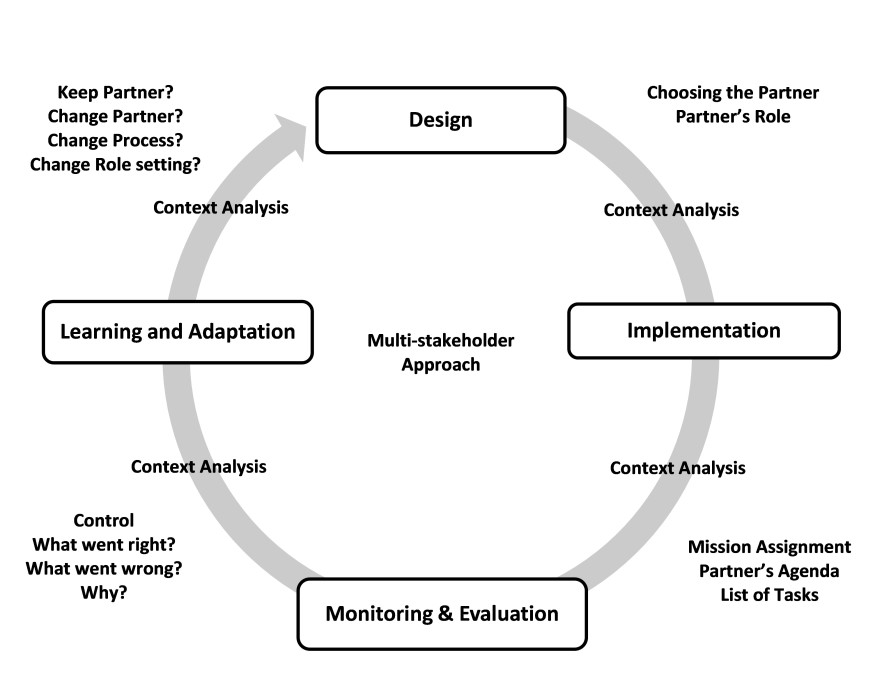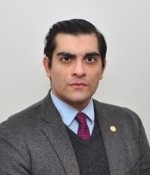The Role of Partnerships
in Post-Conflict Countries
FEATURED PAPER
By Prof. Dr. M. F. HARAKE
CEREGE Research Laboratory
University of Poitiers
Poitiers, France
Abstract
The aim of this paper is to present a general outline of INGOs project management who work with local partners to implement community programs and humanitarian activities. The idea is to review how a well-structured project plan can improve the implementation of both programs and activities while developing sustainable partnerships between different stakeholders to ensure targeted results and improved livelihoods. By checking the structure, process, and dynamic of the project – programs delivery and sustainable services provision can be checked. When it comes to partners, INGOs are working with various local partners ranging from government ministries, departments, local public administrations, non-governmental organizations, cooperatives private sector, etc. Hence, the value of the paper – when it comes to developing a clear project management process that helps strengthening the projects.
Key Words: INGOs; Partnership; Third Sector; International Collaboration; Project Management
- Introduction
The existing and accepted literature developed by both academics and practitioners found that there is a significant gap when it comes to INGOs wanting to foster sustainable local development and their actual capacity for doing so. On another note, some studies have highlighted that INGOs can fall victims to wrong partnerships by collaborating with the wrong entity. Also, many experiences have proven that INGOs need proper project management guidance on how to plan for, implement, and learn from international activities and programs that are piloted in collaboration with local partners (CSIS & AUSA, 2002; Bender, 2011; Brown, 2018).
The aim of this paper is to present an outline of INGOs project cycle and processes when collaborating with local partners while providing further insight about adaptations in diverse contexts and partnerships.

Figure 01. INGO Project Management Cycle’s Multi-Stakeholder Approach
- The Collaborative Dynamic of INGOs and Local Partners
- Context
From an international cooperative perspective based on humanitarian assistance and / or sustainable international development in demised communities and in most cases unstable environments (conflict and natural disasters), international project coordination seeks to improve the effectiveness of humanitarian response by ensuring better predictability, more secured accountability, and better partnership (Hamieh & Mac Ginty, 2010; Brown, 2018).
However, with crises becoming much complex over time – due to the changing nature of how they occur, their build-up, their amplitude as well as their lasting impact – hence, project response coordination becomes in turn much more difficult, and communication among all implicated actors more challenging, and resources more limited (CSIS & AUSA, 2002; Bender, 2011).
More…
To read entire paper, click here
How to cite this paper: Harake, M. F. (2024). Project Management for INGOs working with Local Partners: The Role of Partnerships in Post-Conflict Countries. PM World Journal, Vol. XIII, Issue VII, July. Available online at https://pmworldlibrary.net/wp-content/uploads/2024/06/pmwj143-Jul2024-Harake-Project-Management-for-INGOs-working-with-Local-Partners.pdf
About the Author

Prof. Dr. M. F. HARAKE
Poitiers, France
![]()
Prof. Dr. M. F. HARAKE is a management Professor based in France. He is currently affiliated with CEREGE Research Laboratory at the University of Poitiers (France), and a visiting research fellow at CABMR Research Center (Paris – France). He is also an Honorary Academic Advisor and Research Scholar for the PM World Library (Texas – USA). His research interests include Post-Conflict Public Management, Crisis and Urgent Operations Management, Humanitarian Logistics, and Project Management in Unstable Environments.
He can be contacted at mohamed.fadl.harake@univ-poitiers.fr
To view other works by Prof. Harake, visit his author showcase in the PM World Library at https://pmworldlibrary.net/authors/mohamad-fadl-harake/









